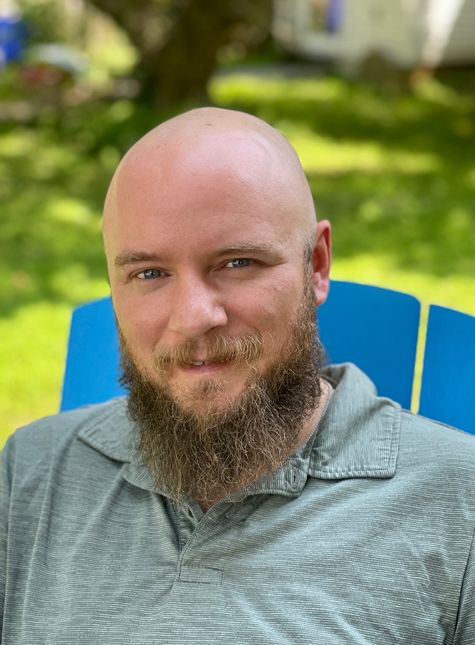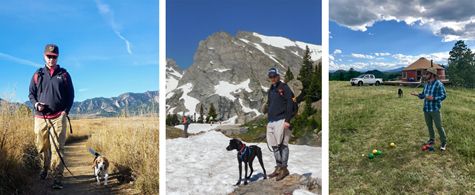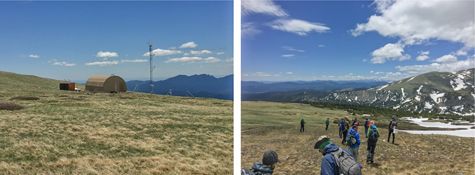Early Career Scientist Spotlight
Dr. Drew Badger (he/him/his)
Hydrometeorologist
Hydrological Sciences Laboratory (617)
How did you end up working at NASA Goddard?
My path to NASA Goddard starts back in 2009 when I started my first NASA internship at NASA Marshall Space Flight Center to research atmospheric density of the Martian atmosphere for entry, descent, and landing purposes. Although different from what I do today, that experience really opened my eyes to not only what doing research at NASA was like, but what doing research beyond the scope of a targeted class project was like. That experience really spurred an interest in me to follow a research-based career path.
After spending four great years in Colorado as a postdoc, I found an opportunity with the Universities Space Research Association (USRA) at NASA Goddard that really piqued my interests and having the opportunity to work with so many great scientists was not something I could pass up on.
Credit: Alli Badger
What is your research focus?
Simply put, water is my research focus. In particular, my work aims to understand how well we can monitor and predict components of the water cycle. Using ground-based observations, remote sensing, hydrologic and climate models, and statistical methods, my research has touched on a variety of aspects of the water cycle.
Currently, my research is focused on hydrologic ground validation (Hydro-GV) of precipitation measurements from Integrated Multi-satellitE Retrievals for GPM (IMERG). Hydro-GV is a method to validate precipitation measurements and products without the use of ground-based observation networks of precipitation. Hydro-GV methods allow for the use of data from synergistic missions to characterize detection and to quantify the volume of precipitation over a broad range of spatial and temporal scales. I am using volumetric soil moisture observations from Soil Moisture Active Passive (SMAP; a NASA environmental monitoring satellite) to detect the presence/absence of precipitation between SMAP overpasses at a global scale. A globally consistent ground validation framework for IMERG over land areas does not exist yet and this is our attempt to provide a much-needed framework.
Before coming to NASA, my research was more broadly focused on the hydrologic cycle. Using tree ring observations and a hydrologic model with Climate Model Intercomparison Project Phase 5 (CMIP5) forcing, we were able to attribute the nearly twenty-year long megadrought in the southwestern US to anthropogenic trends in temperature, relative humidity, and precipitation. I have also applied predictive models to CMIP5 output to understand how our ability to predict streamflow generation from snowpack will be altered in a changing climate. Through my work, I’ve found that current predictive methods will see a loss in predictive skill. Other research interests of mine have included diagnosing flood events based on antecedent soil moisture conditions, investigating how large-scale land-use change alters the regional-to-global water cycle, and estimating soil evaporation from remotely-sensed soil moisture observations.

Credit: Emerson LaJoie
What do you enjoy the most about your job?
I enjoy getting the opportunity every day to work somewhere that is always pushing the boundaries of what we do in the Earth sciences. I like the challenge of applying new methods and ideas to different datasets to broaden our understanding and capabilities. I think one of the coolest aspects of being in a research driven position is that there is always the potential that we will be the first person in the world to know something new, and then we get to tell everybody.
What is one research project that you are particularly excited about, and why?
My first hands-on work with ground validation was when I started at NASA Goddard, and I was intrigued by the idea of validating precipitation observations with other hydrologic variables. My current research project has evolved into the next step, and we are moving beyond detection of precipitation to try and quantify precipitation volumes. There have been very few studies that have tried to validate precipitation quantity using Hydro-GV methods, and none at the scale that we are hoping to implement our work on. Being able to employ some new techniques and methods to potentially do a first of its kind analysis is really exciting.
What are your future research interests and goals?
I want my research to have relevance. Doing research on various components of the water cycle, there are direct real-world implications from what we can learn about droughts, floods, the irrigation of crops, and how the world’s water resources are changing. Ultimately, I’d like to see my research help to guide decision-making related to water resources.
Credit: Drew Badger
What science question intrigues you the most?
What intrigues me the most seems to change regularly, but at the moment I am really curious about how water moves around the globe, not via advection but through products and services. This hidden flow of water is in the produce and meats we buy at the grocery store, in manufactured goods, and in many other aspects in our daily lives. In the background of a changing climate, this balance of supply and demand for both real and virtual water is both an interesting question and real-world thought experiment that will be played out before our eyes. As the need for more sustainable water practices are necessary around the world, I see a critical area of research that can aid in our understanding of water resources as our climate evolves.
What do you like to do in your free time?
Being a father to a toddler has caused considerable changes to the meaning of free time. Food is something that I have always really enjoyed, particularly trying new cuisines, or cooking new things, especially in the smoker. While in graduate school, my roommates and I started “Pork Chop Night” and would take turns preparing pork chops in different ways each week. We did this for over three years without having the same meal twice.
I am an avid reader; I especially enjoy both classic and modern westerns and noir crime novels. Watching my favorite teams – NC State Wolfpack, Carolina Panthers, Washington Nationals and Carolina Hurricanes – is also one of my favorite pastimes.
As a family, we like to be active and explore new places. We really enjoy treks to the zoo, walks along the tidal basin, hikes, and weekend getaways to somewhere with water. During pre-pandemic times, my wife and I enjoyed visiting new cities abroad. We visited seven European countries in 2017 and 2018.
Credit: Alli Badger
Biography
Home Town:
Asheville, NC
Undergraduate Degree:
BS in Meteorology, North Carolina State University, Raleigh, NC
Post-graduate Degree:
PhD in Climate Dynamics, George Mason University, Fairfax, VA




